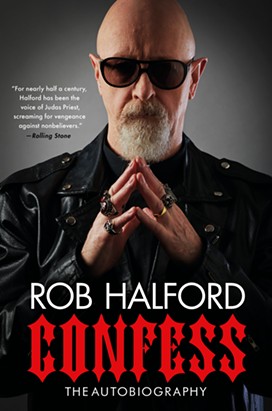Confess: The Autobiography
By Rob Halford
368 pp.
$30
Hachette Books
For much of the 1970’s and ‘80s, even as he was fronting Judas Priest, one of the most popular, loved, and revered heavy metal bands of all time, lead singer Rob Halford was scared shitless. Scared that if the truth ever came out about his homosexuality, his legions of fans would turn their backs in disgust, he’d be held up to ridicule, and it would immediately kill the band’s career.
Growing up in the tough Black Country area of Walsall, England, where everyone’s father seemed to work at the nearby giant metalworks factory, Halford knew from an early age that he preferred boys to girls. And even after he joined Judas Priest, his band mates and business confidantes knew. But as long as he could sing those notes and kick ass…nobody really cared what he did in his personal life.
In those days of pre-cell phones and TMZ, Halford knew he was taking risks with some of his behavior. So imagine his surprise when he finally came out on the spur of the moment in a 1998 MTV interview and…nothing much happened. Fans still bought records and concert tickets in droves, and a huge weight was lifted from the singer’s shoulders. “I imagine[d] a mass chorus of the voices of our hard-won fans in the Midwest and Texas: Fuck! I isn’t going to see no band with a goddamn faggot singer!” he writes.
Though as wags would point out later, Halford’s preferred stage attire of leather, studs, whips, and other regalia was not exactly subtle. Nor were the many hints he dropped in Judas Priest songs as the band’s lyricist. Even he was shocked few caught on to lines like those from “Raw Deal” mentioning leather guys, denim dudes, colts playing “rough stuff,” and even name checking New York’s Fire Island, long a celebrated as a favored destination for homosexual men.
So it’s no surprise that Halford’s struggle with his sexuality – along with booze and cocaine – dominates as much (and maybe even more of) Confess as reminiscing about music, concerts, and recording sessions. Some readers might be taken aback by his tales of truck stop bathroom sex in stalls with glory holes, sweaty trysts with strangers and fans, and details of passionate sex-and-drug fueled relationships with men who someone always turned out to be straight (including one who killed himself with a gun shortly after a screaming fight with Halford).
Though at the top of his career, Halford hit rock bottom in 1986 when with self-loathing and substance abuse. Fortunately, the book’s easygoing narrative style (likely written by an uncredited ghostwriter, music journo Ian Gittins) offers great doses of humor and self-deprecation. And makes it less shocking that it might been. Judas Priest fans will also get a peek behind the curtain at some of the bandmember’s relations and key moments over the years, and he writes insightfully about them.
This includes the bizarre incident in which the band was sued for purportedly inserting subliminal and backwards-masking messages in their songs that “led’ a two fans — ages 19 and 20 — to make a suicide pact after a day of drinking booze, smoking pot, and listening to the album Stained Class. One was successful in killing himself with a gun and the other was severely maimed, later dying of a methadone overdose.
Lawyers for both sets of parents played snippets from songs in which Halford seemed to say (if you listened really, really hard) phrases like “try suicide,” “sing my evil spirit,” “Fuck the Lord, fuck all of you,” and “do it.” As the sole member of the band who testified, Halford said the suggestion was utter nonsense, adding to reporters that if he was putting secret subliminal messages in songs to fans, it would be to “buy more records” and certainly not kill themselves.
Still, these were the days of the PRMC and “heavy metal hysteria, and Ozzy Osbourne has been sued for a similar situation, so emotion may have ruled over logic. But Halford’s authoritative testimony carried weight. As did his own lawyers who produced evidence other incidents of “backward masking” in Priest songs that said (again, if you listened really, really hard) phrases like “Look ma, my chair is broken,” “they won’t take our love away,” and “I-I-I asked for a peppermint.” The band and their record company were acquitted.
Rob Halford would leave Judas Priest some years due to a “miscommunication” and to pursue a solo career, but “The Metal God” returned to the fold and has been touring and recording since. Drug and booze free for 34 years and in a stable, healthy relationship, he writes that while coronavirus has put the kibosh on the band’s planned next album and tour, the now 69-year-old is ready to ride that Harley on stage again and melt audiences faces off, just as soon as he can.
Support Us
Houston's independent source of
local news and culture
account
- Welcome,
Insider - Login
- My Account
- My Newsletters
- Contribute
- Contact Us
The Metal God Confesses Everything. And He Means Everything
[
{
"name": "Related Stories / Support Us Combo",
"component": "11591218",
"insertPoint": "4",
"requiredCountToDisplay": "4"
},{
"name": "Air - Billboard - Inline Content",
"component": "11591214",
"insertPoint": "2/3",
"requiredCountToDisplay": "7"
},{
"name": "R1 - Beta - Mobile Only",
"component": "12287027",
"insertPoint": "8",
"requiredCountToDisplay": "8"
},{
"name": "Air - MediumRectangle - Inline Content - Mobile Display Size 2",
"component": "11591215",
"insertPoint": "12",
"requiredCountToDisplay": "12"
},{
"name": "Air - MediumRectangle - Inline Content - Mobile Display Size 2",
"component": "11591215",
"insertPoint": "4th",
"startingPoint": "16",
"requiredCountToDisplay": "12"
}
,{
"name": "RevContent - In Article",
"component": "12527128",
"insertPoint": "3/5",
"requiredCountToDisplay": "5"
}
]



